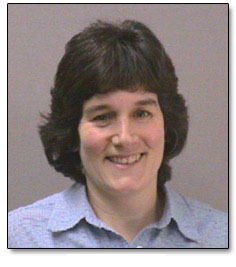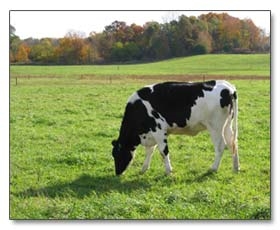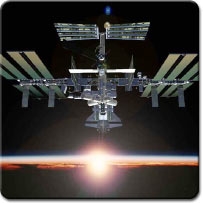 |
| Dr. Karen Plaut (Michigan State University, Department of Animal Science) |
Mooooo. Little did Karen Plaut realize when she was growing up how much she would work with cows as an adult. Raised in Woodstock, New York, she had a dog and a horse as pets, and attended horseback-riding lessons and camp. Otherwise, the only contact she had with farm animals was seeing them on local farms. “I was always into science though, which is strange because my parents weren’t scientifically-oriented at all,” chuckles Plaut; “I remember wanting a microscope for my birthday really badly.”
Upon her arrival at the University of Vermont, Plaut was happy to discover a way to combine her love for animals and her interest in science – a major in animal science. Signing up for classes in biology, chemistry, and math, she also studied animal nutrition, reproductive physiology, and animal care and management. Animal science departments focus on large animals, as opposed to zoology departments, which also study smaller organisms like bacteria and algae, and this appealed to her. The University of Vermont also owns farms, giving Plaut and her fellow students ample opportunity to study cows and sheep in the field. Initially she was interested in ruminant nutrition, the study of how cows and sheep (which have four stomachs) digest their food. She decided to attend Pennsylvania State University for a master’s program in animal science with that focus in mind, but her interest was piqued by a class she took almost as an afterthought her final semester at UVM. This class, in endocrinology, investigated mammary gland biology, or the science of the milk-producing glands in female animals. Plaut found the way different hormones change and interact intriguing, and changed her focus to mammary gland biology, which she has studied ever since.
 |
| Michigan State University The Dairy Teaching and Research Center |
After two years at Penn State and with a Master’s Degree in hand, Plaut moved to another farm-dappled region to pursue a PhD – Cornell University in Ithaca, New York. In the field of animal science, PhD programs do not typically involve additional coursework; rather, they favor full-time research, and in Plaut’s case, five and a half years of it! That was fine by her, though - Plaut’s chief passion is scientific research. Her doctoral project investigated the endocrinology of lactation, or the hormonal processes involved in the production and secretion of milk. Again she studied cows. This subject holds a lot of interest not only for the dairy industry, an important component of the U.S. economy, but also to Plaut, who finds the subject fascinating: “The change in cow’s bodies from pregnancy to lactation is dramatic,” she says. “All of the hormones change as the body shifts its focus from feeding the baby to producing milk.” The knowledge she gained in her study applies to other animals as well. As Plaut points out, “Mammals are called mammals due to mammary glands!”
Plaut took her new knowledge of mammary gland science to a place not normally associated with bovine biology: the National Institutes of Health and the National Cancer Institute in Bethesda, Maryland. At these prestigious organizations she spent two years in a post-doctoral appointment, studying breast cancer and its development - in humans. According to Plaut, mammary development is the same for all animals: lactation is considered normal, and breast cancer abnormal. The basic hormones involved are the same, too, in cows and in humans. Cows do not develop breast cancer and finding large amounts of normal breast tissue samples from humans is difficult, so Plaut compared healthy breast tissue from cows with cancerous tissue from women.
When offered the chance to return to the University of Vermont as a member of the faculty, Plaut eagerly accepted; she taught there for eight years until another unique and interesting opportunity presented itself: working with NASA, the National Aeronautics & Space Administration, to develop life science habitats for the international space station. Plaut worked previously with NASA; when they sent rats up into space, she observed pregnancy in space and also studied their mammary development. Her new task involved acting as the lead scientist for animal habitat development, whereby she worked with biologists from space agencies around the world to develop ecosystems for plants, animals, fish, and insects. She and her husband moved to California for her two-year project at the Ames Research Center. As exciting as the project was, Plaut missed specialized research, and after the project was over, she returned to UVM to accept the Chairmanship of the Animal Science Department. “It was a tough decision for me, whether to leave NASA or not,” recalls Plaut. “Choosing between a civil service position with the government and a tenured professorship is an enviable position. But as Chair of the department at UVM, I had a chance to build on something bigger than myself and also help other people develop.” She remained at UVM for five years before another exciting opportunity presented itself – through a phone call from Michigan.
 |
| The International Space Station (NASA) |
Agriculture is a major part of Michigan’s state economy, and its dairy production ranks 7th in the nation. Michigan State University recently passed a $72 million animal industry initiative, and its large and diverse Animal Sciences Department, which includes divisions for dairy, beef, swine, sheep, and a center for animal functional genomics, needed a new Chair. Due to her outstanding reputation and strong leadership at UVM, Plaut was offered the position. Once again, she was lucky to have two great options from which to choose; her research at UVM was moving forward and the department was growing, but in the end, the breadth and depth of Michigan State’s department could not be ignored. “Michigan State is a leader in genetics research and at the forefront of embryonic stem cell development. We have the tools needed for the future, the people who know the applications, and the ability to advance sustainable agriculture,” says Plaut, who took over the Chairmanship in January 2005.
Although she does not consider herself a political person, Plaut’s advancement in her field has forced her to confront issues of gender equality and representation. She was the first female chair of a department of Animal Science (the only other presides at University of California, Davis) and often finds herself the only woman in a room of her colleagues. Admittedly, with every job she has been offered, Plaut has heard comments about her gender being the main reason for selection. “I hear these types of remarks,” she says, “and I just don’t bother myself with them. The bottom line is - man or woman – if you set your mind to something, and it is what you want, you’ll be successful. Everyone needs to find something they enjoy and do his or her best at it.”
For Dr. Karen Plaut, animal science is this subject, and her resume obviously reflects the amazing amount of success – and diversity of experience - she has enjoyed in following her passion. “The sky is the limit with a basic scientific education,” she gushes. “Kids should realize that it is possible to combine your love for animals with science and create tons of possibility for the future.”
Page created on 1/4/2008 5:39:08 PM
Last edited 1/9/2017 9:54:05 PM
